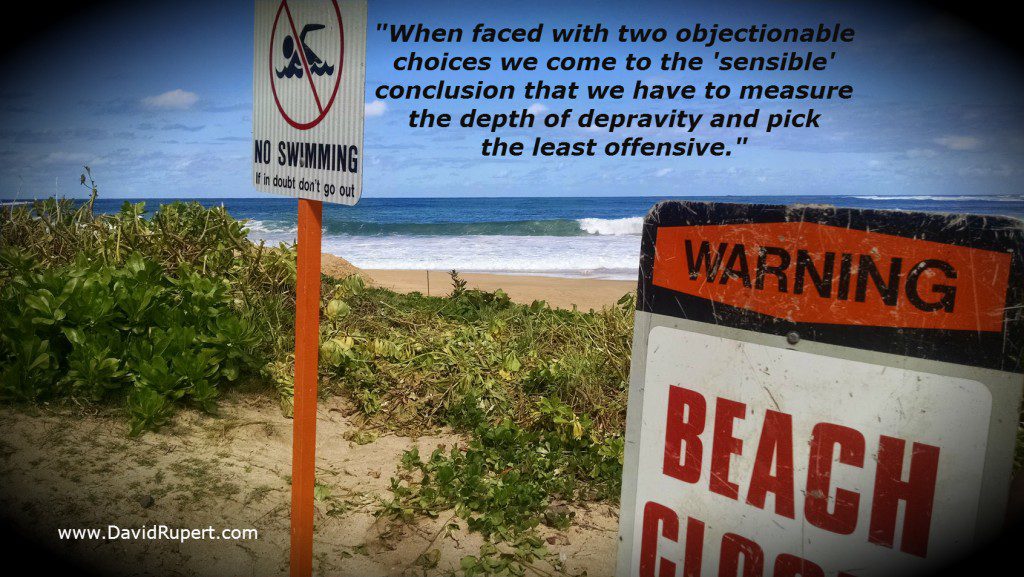Chocolate. Vanilla. Twist.
I remember the ice cream machine at Frosty’s Diner in Northern Nevada’s Carson Valley.
Mom would load the kids and make the drive over the mountain pass. At the end of a day of shopping this was our special treat. She would pull the station wagon packed with groceries and supplies and we would bounce to the counter to see the machine.
The machine would spit out chocolate or vanilla with a pull of the lever. And to please the indecisive, the menu even offered a “twist.” The problem is that I didn’t like either. I was a strawberry guy and the two basic and one blended choice were less than interesting.
With Mom, there was no “opting out.”
“Don’t just stand there,” she said. “Just pick one.”
So I did and I never really enjoyed the moment.
Not right. Not left. How about “neither?”
Unfortunately, in our modern society, we are given moral choices that are far more serious than ice cream. We long for a black-and-white world, one in which right and wrong are clearly defined. Instead, both choices are a twist of the other.
Increasingly I find that I’m simply not interested, almost appalled at what’s before me. It seems as if our choices are often narrowed down to just two. We look at one, put it down in disgust. Pick up the other, and put it down, disappointed. Deep inside, we’re torn. Less repugnant is still repugnant.
Three seems like a better choice. When I’m given those multiple choice answers generally I’ll pick the one in the middle. “Very Satisfied. Satisfied. Not Satisfied.” Yes, the middle choice is me.
Carol Merril and Monty Hall always had a Curtain #3 on the Price is Right.
The motivational post at work even has three choices. “When something bad happens you have three choices. You can let it define you, let it destroy you, or you can let it strengthen you.”
But the societal divide is rising higher and higher down the cultural middle and we are forced to slide to one side or another. There’s left. There’s right. What about “neither?”

What does God have to say?
The problem with a Christian people who are increasingly influenced by secular thoughts, we don’t measure our choices by God’s standard. His choice isn’t consulted, instead we pick one of the two options and then ask for his blessing.
When faced with two objectionable choices we come to the “sensible” conclusion that we have measure the depth of depravity and pick the least offensive.
“This is bad, but not nearly as bad as the other choice.”
How many spouses are picked among the only two suitors left on earth – “Mr. Wrong” and his brother “Trouble.”
So how much evil is acceptable when you make a choice? Is it less than 50 percent? How about less than 10 percent? How about 1 percent? Would we ask a Christian doctor to pick between abortion and assisted suicide, weighing the two to see which one is “less evil?”
Compromise is unsupportable in the Christian ethos. Colossians 2.8 says, “See to it that no one takes you captive through hollow and deceptive philosophy…”
How many people today stand on principle alone? Remember Shadrach, Meshach, and Abednego? They didn’t pick the “lesser of two evils” when they stood up the Babylonians. Neither did Daniel. Peter and John chose to do “what was right in the sight of God.” They all paid a price, but they stood for what was right.
Choosing the lesser of two evils drives much of our U.S. Foreign policy and explains why we pick zealots over dictators, strong-arm capitalists over Communists, and tepid foes over dangerous enemies. Syria is a great example of this kind of decision-making and where it gets us.
Remember we supported Sadaam Hussein against the mullahs in Iran. And we later deposed Hussein as an evil man. Now we are now giving nuclear weapons to the mullahs.
I cannot escape that choosing the lesser of two evils is still choosing evil.
What about voting?
For historical perspective, remember the 2002 French presidential election? Parisian graffiti told people to “vote for the crook, not the facist.” Jacques Cirac beat out Jean-Maire le Pen and the rest is history.
When pressed about an ethical choice in his contemporary election, Charles Spurgeon said this, “Of two evils, choose neither.”
You are probably wanting me to make some point about current American politics. Sorry to disappoint, but I’ve said enough.














